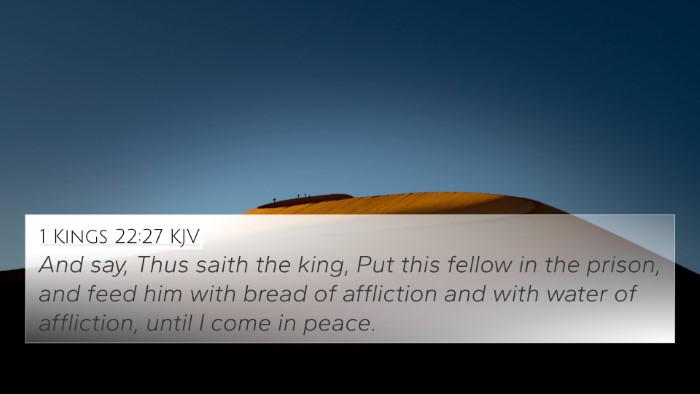Understanding Judges 8:9
The verse Judges 8:9 states, "And he said unto the men of Penuel, When I come again in peace, I will break down this tower." This verse is part of the narrative where Gideon, after achieving a significant victory, confronts the people of Penuel for refusing to assist him in his battle against the Midianites. This passage highlights themes of leadership, accountability, and the consequences of rejecting divine guidance.
Verse Context
Gideon, a deliverer raised by God, shows both mercy and strength through his response to the uncooperative men of Penuel. This situation reflects upon how leaders hold their followers accountable for their actions and how those actions have consequences.
Commentary Insights
Matthew Henry's Commentary
According to Matthew Henry, this verse captures the gravity of Gideon's warning. Although he had shown restraint and mercy, the hostility of Penuel compelled him to assert that should he return, it would not be in peace. The tower symbolizes strength and security, which Gideon threatens to dismantle as a lesson to those who defy God's anointed leader.
Albert Barnes' Notes on the Bible
Albert Barnes elaborates on the setup of the region of Penuel, emphasizing that the refusal of aid during Gideon's pursuit of the Midianites demonstrated a lack of faith and support for God's work. His promise of retribution signifies the seriousness of failing to engage in God's plans and highlights the duty of those in leadership to act justly against opposition.
Adam Clarke's Commentary
Adam Clarke points out that Gideon’s intention to return and confront the men of Penuel shows the repercussions of their disobedience. It indicates that even in battles fought in faith, there must be unity and support among God’s people. Clarke emphasizes the importance of community in fulfilling God’s command and how the actions of one can lead to dire consequences for many.
Cross-Referenced Themes
This verse connects with several other scriptures that illuminate the themes of leadership, accountability, and judgment:
- Proverbs 29:12: "If a ruler hearken to lies, all his servants are wicked."
- Luke 19:27: "But those mine enemies, which would not that I should reign over them, bring hither, and slay them before me."
- 2 Samuel 12:7: "Thou art the man! Thus saith the Lord God of Israel..." - A reminder of accountability in leadership.
- Matthew 7:2: "For with what judgment ye judge, ye shall be judged..." - Speaking to the consequences of actions taken against God's servants.
- Psalm 86:14: "O God, the proud are risen against me..." - The challenge of leaders and their adversaries.
- Jeremiah 23:1: "Woe be unto the pastors that destroy and scatter the sheep of my pasture!" - A warning against poor leadership.
- Ephesians 6:8: "Knowing that whatsoever good thing any man doeth, the same shall he receive of the Lord..." - The principle of reaping what one sows.
Practical Application
As we reflect on Judges 8:9, we can draw lessons relevant to our lives: accountability in leadership, the importance of supporting God’s work, and the eventual outcomes of our choices. By engaging in scripture study through tools for Bible cross-referencing, we can understand the ramifications of actions both in historical contexts and in our personal lives.
Tools for Bible Cross-Referencing
Utilizing resources like a Bible concordance or a cross-reference Bible study guide can help deepen your understanding of how various scriptures interact and reinforce one another. This method of study enables believers to explore:
- Identifying connections between Old and New Testament
- Detailed cross-reference between Gospels
- Comparative study of Pauline epistles
Conclusion
Ultimately, Judges 8:9 underscores the necessity of collaboration and the severity of consequences arising from disobedience. Understanding the interconnectedness of biblical texts enhances our grasp of God’s message and helps us witness the enduring relevance of scripture in our lives.




